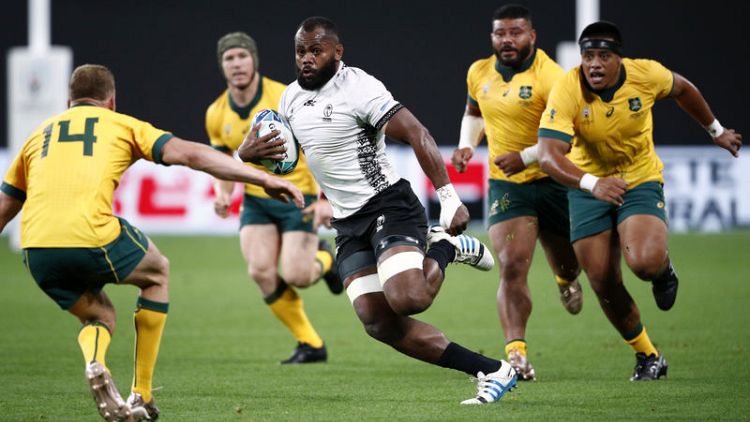By Nick Mulvenney
TOKYO (Reuters) - The credibility of World Rugby's campaign to rid the game of dangerous high tackles suffered a hefty blow on the opening weekend of the World Cup when what many thought was a cut-and-dried case for a red card was let go by match officials.
Australia winger Reece Hodge still faces a lengthy ban after being cited on Sunday for the tackle on Fiji flanker Peceli Yato in the 26th minute of his side's come-from-behind 39-21 victory in Sapporo on Saturday.
Retroactive action, however, will not change the fact that Fiji lost the best player on the field up to that point for the rest of the match, as well as for Wednesday's game against Uruguay as Yato fulfils concussion protocols.
World Rugby had made much of the clarity of their framework for dangerous and high tackles ahead of the World Cup, even screening a video of the decision process for the media at a briefing in Tokyo on Monday.
Although few are suggesting any malicious intent on Hodge's part, former England captain Lawrence Dallaglio certainly felt the tackle fulfilled the first two stages of the process and that there appeared to be little basis for a plea of mitigation.
"Is it high? Yes. Is there head contact? Yes. World Rugby is very clear on this," Dallaglio said on Britain's ITV.
Dallaglio was not alone, with many media pundits blasting the decision, while there were rumblings too on social media from those who believe top-tier nations get preferential treatment from officials.
To make matters worse, Fiji captain Dom Waqaniburotu said he had asked the referee to check the incident with the Television Match Official (TMO) when it was missed on field. He was told the tackle had been cleared.
BETTER PREPARED
World Rugby chief executive Brett Gosper said on Tuesday he felt that, with the training they had received and the technology at their disposal, match officials were better prepared to deliver consistency than at any previous World Cup.
However, if the citing committee decides this week that Hodge was guilty of a dangerous tackle, questions will again be raised about the system.
Argentina coach Mario Ledesma also lambasted the referee after the Pumas lost 23-21 to France on Saturday, accusing Australia's Angus Gardner of missing blatant fouls as his side chased what would have been a winning score.
Rugby union has always been unusual as a sport because of the influence a referee's interpretation of the laws can have on a match, with the best officials using the latitude they are allowed to keep the game flowing.
It also means, though, that complaints about inconsistency are common, while coaches often use their pre-match press conferences to point out areas in the opposing team's play they would like referees to focus on.
There was plenty of discussion before the World Cup about how the focus on dangerous hits was changing the breakdown, while South Africa coach Rassie Erasmus said he thought successful teams got the benefit of 50-50 decisions.
Erasmus made his comments in the run-up to Saturday's blockbuster clash with New Zealand in Yokohama but if they were intended to sway French referee Jerome Garces, it did not work.
The Springboks were penalised far more than the All Blacks as they succumbed to a 23-13 defeat, triggering outrage among their fans.
And even the victorious All Blacks were not entirely clear about how Garces was policing the game.
"(South Africa) breached us pretty easily on some occasions and maybe some of the things we were looking for with the ref didn't help us either," said scrumhalf Aaron Smith. "We were moaning a bit, 'what is that? what is that?'"
(Reporting by Nick Mulvenney, editing by Tony Lawrence)


